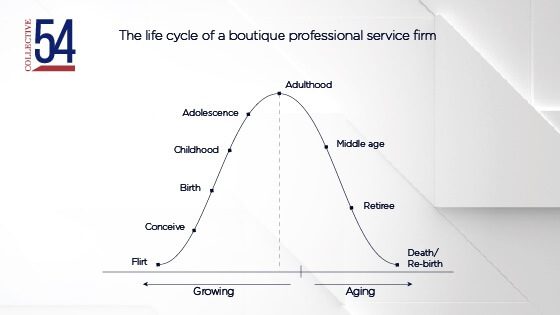The Tired Founder: How to Rehabilitate an Old Lifestyle Firm

Did you know the average age of a successful founder is 45, according to Harvard Business Review? When most think “entrepreneur,” they think of the young college dropout who invented the next hot thing. But the young dropout is rare, and the middle-aged founder is common.
In the professional services industry, this is even more true. Why? Experience matters a lot. Professional service firms are in the business of expertise, and it takes several years to build up the required experience. Clients hire advisors to give them advice, and for that advice to be credible, it must be sourced from years of hands-on involvement.
This late start to founding a boutique professional service firm can, at times, result in a phenomenon called “the tired founder.” This occurs when the effort required to win exceeds the energy level of the founder, leading to founder burnout. This happens when the age of the founder is much older than the age of the firm.
The natural habitat of a tired founder is a lifestyle business
In my book, I state the lifecycle of a boutique professional service firm is 15 years from launch to exit. If a founder starts her firm at 45 and invests 15 years into it, then she is 60 years old when she sells it. This results in a natural lifecycle.
Sixty years of age is the time many would like to retire or slow down a bit. However, a problem arises when a firm takes longer than 15 years to complete its journey. For instance, if a firm takes 25 years, the founder will be 70 years old at the end. Most founders do not want to spend their 60s dealing with the stresses of being an entrepreneur. And this can lead to the tired founder phenomenon. The firm requires lots of energy to succeed, and the founder does not have enough gas in the tank to make it happen—which can lead to them losing passion for work and experiencing the dreaded founder burnout.
You can also see this in firms that have been operating for the same amount of time but are led by very different founders. For example, there are young 15-year-old firms, and there are old 15-year-old firms. The young firms are flexible, progressive, and leading edge. They win because they are faster and more aggressive than their competitors. Old firms are resistant to change, inflexible, and seek the comfort of stability. They lose because they are slower and more conservative than their competitors. “Old” firms are run by tired founders and have settled into their firm being a lifestyle business vs. a growth business.
Are you a tired founder? Eyeball this set of contrasts. Which describes you?
Energetic Founder | vs. | Tired Founder |
Success comes from risk-taking | vs. | Success comes from avoiding risk |
Expectations exceed results | vs. | Results exceed expectations |
Momentum | vs. | Inertia |
Forgiveness | vs. | Permission |
Opportunities | vs. | Problems |
Sales dominant culture | vs. | Financial dominant culture |
Meritocracy | vs. | Politics |
Beating the tired founder phenomena
There is nothing you can do about your chronological age. And you cannot go back in time and start your firm earlier. The date of founding is fixed. However, there are things you can do to prevent becoming a tired founder.
For instance, the mental age of the founder does not need to be the same as the biological age. Have you ever met a 60-year-old founder who has the energy of a 40-year-old? I have. Many are members of Collective 54, and these founders are not tired but rather are full of energy, leading fast-growing firms.
These remarkable founders have not given up on their dreams. They still have lots of drive and do not just accept what is happening to them. They’ve faced founder burnout and won. These founders want more. They have ambition. A sleepy lifestyle firm for them is a prison sentence. Don’t let the number of candles on your birthday cake define you.
If you are a real entrepreneur, and not a small business owner masquerading as one, never stop going for it. Thrive instead of survive is the attitude.
Another action to take is to fall in love with your protégé. The professional service industry rests on the apprenticeship model. Without Woody Guthrie, the world would have never heard Bob Dylan play music. Without Maya Angelou, our spirits would never have been lifted by Oprah Winfrey. If Ralph Waldo Emerson had not mentored Henry David Thoreau, we would never get to read Walden. If Zuckerberg hadn’t gotten schooled by Jobs, we would never get Facebook.
Need an example closer to home? Listen to my interview with Tad McIntosh, who, at 56 years old, is reinventing a 20-year-old HR consulting firm. Tad should be a tired founder, but he is not. He’s striving for growth vs. a lifestyle business.
If you got a late start to entrepreneurship, and success is taking longer than anticipated, identify your protégé and pour your heart into that person. He or she can carry the torch for you and make sure your life’s work means something someday.
There is another way to avoid being a tired founder. Join a mastermind community. By doing so, you will be surrounded by peers who are “growing through what they are going through.” There is no reason to fight the tired founder phenomena alone. If you run a professional service firm (i.e., consulting, marketing agency, software development, training, legal, accounting, etc.), check out Collective 54. It is filled with those who should be tired founders but are anything but.
